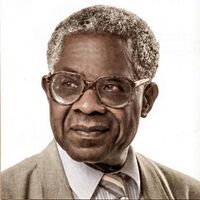Gawon Rabiu
Gawon Rabiu | |
|---|---|
 | |
| 1st President of Wale | |
| In office 3 February 1948 – 3 February 1958 | |
| Prime Minister | Malek Ngor Joseph Nzeogwu Akina Ojukwu |
| Preceded by | Office established |
| Succeeded by | Mabok Mabior |
| 5th Secretary-General of the Community of Nations | |
| In office 1 January 1962 – 31 December 1971 | |
| Preceded by | Oriol Giménez Huguet |
| Succeeded by | Xiujien Nŭyyöhō |
| Personal details | |
| Born | Gawon Rabiu April 10, 1904 Sehia, Wale |
| Died | June 15, 1998 (aged 94) Jagurta, Wale |
| Political party | PAPU-CBN |
| Military service | |
| Allegiance | Template:Country data Estmere Estmere |
| Branch/service | Estmerish Army |
| Years of service | 1927-1936 (active service) |
| Rank | Lieutenant |
| Unit | King's Bahian Rifles |
Gawon Rabiu (4 April 1904 – 15 June 1998) was a Walean historian, linguist, politician, and political theorist who, for a decade, served as the first president of Wale (1948-58). Ideologically an Pan-Bahian socialist, he was the major theoretician of Umoja. Rabiu was also the founder of the Congress of Bahian Nationalities, which he merged with the Popular All-People's Front in 1944.
Rabiu was born in Sehia, Wale, into an affluent Mai family. He attended the University of Catherby, where he read Estmerish language and literature. In 1927 the Great War broke out, and Rabiu volunteered, serving in the Estmerish army until 1936, having achieved the rank of lieutenant. Rabiu undertook a masters in Oriental studies at the University of Warminster in 1937, and continued further postgraduate studies until 1939 when he returned to Wale. In 1941 he founded the Congress of Bahian Nationalities (CBN), a pan-Bahian party, and spearheaded the movement for Bahian decolonisation. In 1944 he agreed with Malek Ngor to merge the CBN with the Popular All-People's Front.
In 1948 Wale received independence, and Rabiu was elected its first president. Rabiu's principal policy was Umoja, which sought internal unity within Wale, a nation of numerous ethnic and linguistic groups, and unity across Bahia. Rabiu worked to decrease ethnic and religious tensions in Wale. In 1951 he declared Estmerish, Badawiyic, and Tujari to be the official languages of Wale, and began a policy of multilingualism and language protection.
In 1958 his second term expired and he declined to run for a third, being succeeded by his long-term ally Mabok Mabior. Rabiu dedicated himself to pan-Bahian activities. He served as the Secretary-General of the Community of Nations from 1962 to 1971. After this he retired from politics and dedicated himself to Bahian history and linguistics, sparking the Murya movement.
Rabiu passed away on June 15, 1998, receiving a state funeral. He is regarded as one of the most important Bahian intellectuals and politicians of the 20th century.